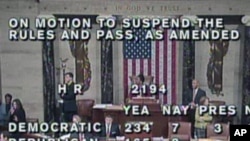When public policy decisions are being made in the United States,. corporations, advocacy groups, and others interact with Congress and the government's Executive Branch to influence those decisions. This activity, called "lobbying," is sometimes accused of promoting so-called special interests at the expense of the public at-large.
In Washington, the word "lobbying" means an effort to influence legislation or government policy. This is done through contact with Congress and with the Executive Branch's departments and agencies. Lobbying is a huge business, with nearly 3-and-a-half billion dollars spent on it in 2009.
Laws and regulations can be so complex that it takes legions of lawyers to navigate through them and craft strategies for changing their provisions.
Law firms engaged in lobbying perform those services on behalf of their clients. One of the most prominent lobbying firms in Washington is Patton Boggs, where partner Nicholas Allard says he and his colleagues offer essential skills, much like a dentist.
"I would not -- and you would not -- try to do a root canal on ourselves. And, that you turn to an expert [a dentist]. And so, put in those terms, the reason why people have expert advocates -- or lobbyists -- is that you need expertise," Allard states. "And, what we are providing to our clients - whether they are big corporations or individuals, whether they are paying top dollar for the expertise on a business issue, whether it is pro bono [without charge] --- and we do a lot of that -- is expertise. We are providing analysis, advice, and also, expert advocacy.
Part of that expert advocacy Allard refers to is the ability to reach key people who decide on laws and policies. At the Washington Examiner newspaper, reporter Tim Carney explains why familiarity is so important to achieving success for clients.
"Most of the time, a lobbyist might be somebody who used to work for a particular Congressman," Carney says, "and so, he can get a meeting with that particular Congressman, because the Congressman knows 'He [the lobbyist] is not going to waste my time.' Or, 'He is well informed, or he is well educated.' And so, it is in your interest as a company to hire that former [Congressional] staff member of the Congressman. So, it is access -- that is what it is really about."
Much like a political campaign, lobbying involves the crafting and delivery of so-called "messages" directed at lawmakers and regulators, in hopes of influencing their decisions. And, these messages constantly bombard Washington through a variety of media, as Ken Vogel at the Politico newspaper points out.
"The way that these folks [lawmakers and regulators] are targeted takes many forms, including not just traditional lobbying, where what you have is people going and meeting in an office or a conference room somewhere. But also, advertisments in newspapers, advertisments on the subway, advertisments on television during football games on Sunday," Vogel said. "All of these ads, all of this lobbying, even though it does not fit into the traditional idea of what we think of as lobbying, is intended to do the same thing. And, that is, to influence the policy outcomes, the regulatory outcomes, the contracting outcomes, that take place on the decisions that are made here in Washington."
One example of a multi-media lobbying bombardment is the fight between two aircraft makers, Boeing and a European company, Airbus, to win a lucrative Air Force contract for new tanker planes. Along with using conventional lobbyists, both companies have put out their messages through TV and newspaper ads and other media. The fight between Boeing and Airbus also highlights the growing effort of foreign corporations and even nations to use lobbyists to influence Washington decisions.
Patton Boggs lobbyist Nicholas Allard reflects on how international problems spur international involvement. "Perhaps the biggest [recent] change in lobbying is that it is increasingly international, and multi-national. On most big policy issues - [such as] climate change, financial services regulation - there is widespread, almost universal, understanding around the world that you cannot act unilaterally," he said.
So as long as there are interests to protect, profits to be made, and rights to be asserted, there will be people attempting to influence legislation and regulations. Sometimes fairly, sometimes not.









